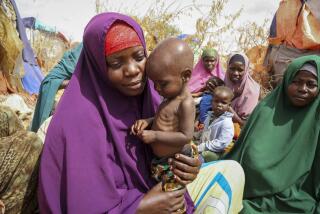Food Safety: An International Problem : Study: A newly released United Nations report finds that in developing as well as industrialized nations, food and water contamination is vastly underestimated.
- Share via
Massive food relief to countries ravished by hunger and malnutrition--such as that now under way in Somalia--may initially sustain victims of famine, but unless a comprehensive system is in place to prevent subsequent food and water contamination, the benefits will be temporary, according to a United Nations report released last week in Rome.
Diseases caused by food-borne pathogens are just as likely as hunger to undermine a nation, and these illnesses disproportionately strike developing regions, according to the study by the U.N.’s Food and Agriculture Organization, delivered at the International Conference on Nutrition, which concluded Friday.
While the report primarily focused on industrialized countries’ food systems, it emphasized that a nation without a sound food distribution network or infrastructure will be plagued with chronic, and often widespread, illnesses.
The U.N. estimates that as many as three million children die each year as a result of diarrheal diseases, 70% of which are the result of food poisoning. However, even these estimates are vastly underestimated, the FAO reports.
“Too often health professionals overlook food as a source of disease and public health problems because their primary focus is on communicable diseases or epidemics,” the FAO states. “Only a small proportion of (food poisoning) cases come to the notice of health services and even fewer are investigated. As a result, it is believed that in industrialized countries only 10% (of the food-borne diseases) are reported, while in developing countries reported cases probably account for not more than 1% of the total (reported).”
The conferees discussed various plans of action to deal with food safety issues and will publish their recommendations sometime next year, said Lora Iannotti, with the U.N.’s Food and Agriculture Organization in Washington.
Inadequate food and water systems can devastate a nation economically as well, the report states. To date, the cholera epidemic that began in South America in 1991 has caused 600,000 illnesses and 5,000 deaths. Hardest hit by the outbreak is Peru, which in addition to absorbing tremendous health care costs, also lost $700 million in 1991 food export revenue, according to FAO. (Contributing to the spread of cholera in Peru is an inadequate water and sewage system.)
The economic toll in industrialized nations can also be substantial. The U.N.-sponsored study found that “many countries are experiencing a dramatic increase in several food-borne diseases.”
FAO reports that Salmonellosis alone costs the United States $1 billion annually in health care costs and lost economic productivity. Often overlooked, the FAO stated, is the fact that at least 2% of the people infected by salmonella go on to develop arthritis, further increasing medical costs and limiting workers’ effectiveness.
The problem in industrialized nations is the nature of the food processing chain, which involves several stages during which numerous human errors can occur before the product finally reaches consumers.
“Food handlers are frequently poorly paid, with low motivation, and have little understanding of the risks of microbial or chemical contamination or how to avoid them,” the FAO found.
Other problem areas include the proliferation of street food vendors and mass feeding operations such as those in hospitals, schools, corporations and airlines.
“Access to safe, reliable and nutritious food supplies is a basic need for all people,” states the FAO. “Consumers have a right to safe food.”
More to Read
Sign up for Essential California
The most important California stories and recommendations in your inbox every morning.
You may occasionally receive promotional content from the Los Angeles Times.










